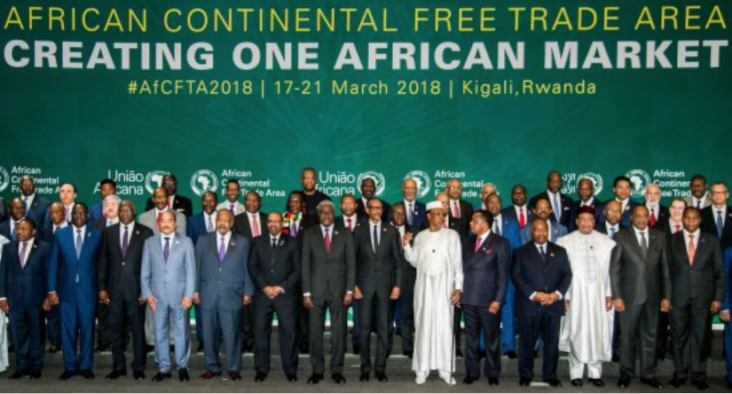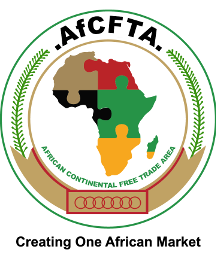
The Central Bank of Nigeria (CBN), on Tuesday, reiterated the huge economic opportunities for operators in the country, especially access to new markets worth over US$666bn, offered by the African Continental Free Trade Agreement (AFCFTA).
Also on offer, according to Godwin Emefiele, the CBN Governor, include “new export opportunities, particularly in the area of Manufacturing, ICT, Agriculture and Financial services, given our growing advantage in these areas relative to our counterparts in other parts of Africa.”
Emefiele said while Nigeria can serve as a significant hub for international and domestic manufacturing companies seeking to serve the West, Central, and East African Markets, a partnership with the AfCFTA governing body is necessary to address major concerns.
The CBN governor, who spoke at the 2021 Export Seminar organized by Zenith Bank Plc listed the negative concerns as smuggling of goods produced in non-African countries into Nigeria, “and abuse of rules of origin have often resulted in significant job losses and displacements of workers in key sectors of our economy such as agriculture and manufacturing.”
He urged existing exporters to repatriate their export proceeds as required by law, offering them the CBN guarantee of “unfettered access to their export proceeds. and we do expect that exporters would reciprocate the good gestures of the (apex) bank by repatriating their export proceeds to improve foreign exchange inflows into the country.”
While applauding Zenith Bank for focusing on improving Nigeria’s non-oil exports and expanding intra-regional trade, the governor stressed that “initiatives being put in place by the CBN would help to ensure that Nigerian businesses are able to take advantage of the growing opportunities in the African market.
“Ensuring that procedures on rules of origin are strictly adhered to by other African countries would also help to reduce the negative effects that come with the implementation of the AFCFTA,” he further noted.
Emefiele stressed the need for collaboration “to support increased growth of our non-oil exports as it would help to enable greater economic growth and improve our foreign exchange earnings.
Greater intra-African and global trade, he agreed, “is vital to the CBN’s objectives of enabling greater economic growth and creating employment opportunities for our growing population in Nigeria.
“Trade enables specialization, economies of scale and it also provides significant rewards to those who are innovative, as they can sell their goods and services to an expanded market.”
The impact of the COVID-19 pandemic on crude oil prices in 2020, including a significant decline in government revenues, and foreign exchange earnings, he continued, have strengthened the case for diversification of Nigeria’s economy, creating new trade opportunities as part of the recovery efforts.
He, however, called for Improvement in the country’s business environment, which he described as vital, if Nigeria is to harness the gains of the AFCFTA.
“The Central Bank through our Trade Monitoring System portal (TRMS) is also helping to reduce the time it takes to complete the export documentation process, as faster turnaround time could help to reduce delivery time for goods destined for exports and enable businesses to expand their output. Today, businesses can complete their NXP applications on the TRMS portal in 30 minutes relative to two years ago, where it could take as much as two weeks to complete the process.”

Although the economy emerged from recession in the last quarter of 2020, due to significant interventions aimed at stimulating consumption expenditure by the monetary and fiscal authorities, “a strong and well-balanced recovery will require additional contributions from the private sector in supporting greater growth of our non-oil exports.
“The volatility in the oil markets which has exposed the Nigerian economy to significant exogenous shocks, along with the growing trajectory towards lesser use of fossil fuels in the near future, by some advanced and emerging market countries, makes it imperative that we work to significantly improve our non-oil exports earnings.”
He said the AfCFTA will provide an opportunity for Nigeria’s very young energetic population that has been leveraging technological applications to improve service delivery in the areas of finance, logistics, and agriculture to consumers in Nigeria to expand their services across the African region.
“Developing trade portals that could support instant sales of goods manufactured in Nigeria to consumers in other parts of Africa is one aspect that can help to support the creation of jobs in Nigeria and improve foreign exchange inflows for the country.”
He acknowledged the significant role being played already by Nigerian banks as they expand across the African continent, urging “them to also leverage their presence in other parts of Africa, to support Nigerian businesses seeking to expand into new markets in Africa, by providing trade facilities to those with strong potentials for growth.”
Emefiele said the CBN has taken considerable steps in such sectors as agriculture and manufacturing to expand the scale of production, meet growing domestic demand, and thereafter provide for the export market to improve the capacity of businesses.












